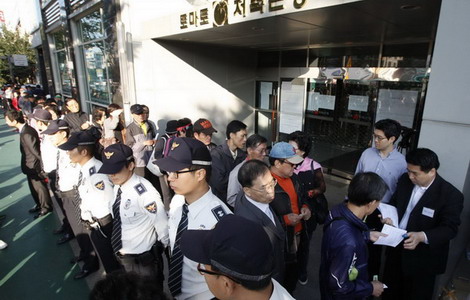China condemns US arms sales to Taiwan
Updated: 2011-09-22 05:28
(Xinhua)
|
|||||||||||
BEIJING - China on Wednesday expressed strong indignation and resolute opposition over a new round of US arms sales to Taiwan.
Chinese Vice Foreign Minister Zhang Zhijun was instructed to summon the US Ambassador to China Gary Locke and lodge strong protest to the US side.
Zhang Yesui, Chinese ambassador to the United States, also lodged strong protest on behalf of the Chinese government in Washington.
Regardless of China's repeated solemn representations, the US administration announced a new arms package worth $5.852 billion to Taiwan, including the so-called "upgrading" of F-16A/B fighter jets.
"The wrongdoing by the US side will inevitably undermine bilateral relations as well as exchanges and cooperation in military and security areas," said Zhang Zhijun.
"China strongly urges the United States to be fully aware of the high sensitivity and serious harm of the issue, seriously treat the solemn stance of China, honor its commitment and immediately cancel the wrong decision," he told Locke.
He asked the US side to stop arms sales to Taiwan, halt military relations with Taiwan and work with Chinese side to jointly safeguard the overall situation of Sino-US relations as well as the peace and stability across the Taiwan Straits.
The Taiwan issue concerns China's sovereignty and territory integrity, concerns China's core interests and the national feeling of 1.3 billion Chinese, and it is always the most important and most sensitive core issue in China-US relations, said Zhang.
The wrongdoing by the US side severely violates the three Sino-US joint communiques, in particular the principles enshrined in the August 17 Communique, said Zhang.
It severely interferes in China's internal affairs, severely undermines China's national security, damages China's peaceful reunification and Sino-US ties, runs counter to the momentum of peaceful development in cross-Straits relations, and runs counter to the principle of jointly building Sino-US cooperative partnership, Zhang said.
The "August 17 Communique" states that the United States will not seek to carry out a long-term policy of arms sales to Taiwan and intends to gradually reduce arms sales till the issue is finally resolved, Zhang noted.
"Facts have shown that the United States does not fulfill such a commitment in the communique, on the contrary, it sells arms to Taiwan time and again on various excuses," Zhang said.
The relations across the Taiwan Straits have improved significantly since May 2008, and the two sides have signed and implemented the cross-Straits Economic Cooperation Framework Agreement (ECFA), the official said.
People across the Taiwan Straits and the international community have all benefited from the increasingly close cross-Straits exchanges, Zhang added.
"The new round of US arms sales to Taiwan, no matter in what excuses and reasons, can not hide the intention of interfering in China's internal affairs and will send very wrong signals to the 'Taiwan independence' secessionist forces, and will severely disturb the momentum of peaceful development in cross-Straits relations," Zhang added.
Zhang noted that, through joint efforts, Sino-US relations have maintained stable development and made new progress in line with both countries' long-term interests.
The US side should cherish the hard-won situation and work with China to constantly consolidate and push forward the positive momentum, rather than take actions once again to harm China's core interests and bilateral cooperation, he said.
"There is only one China in the world, and Taiwan is an integral part of Chinese territory," Foreign Ministry spokesman Ma Zhaoxu said in a written statement.
"Nobody can sway the strong will of the Chinese government and people to safeguard national sovereignty and territorial integrity and to fight against external interference," Ma said.
He asked the US side to really respect China's sovereignty and territorial integrity and observe the three Sino-US joint communiques and the basic norms of international relations.
He also urged the United States to stop selling weapons to Taiwan and halt military relations with Taiwan, so as to avoid further damage to the sound development of both Sino-US relations and cross-Straits relations.
Hot Topics
Organ transplant bonds mother and son
Editor's Picks

|

|

|

|

|

|







